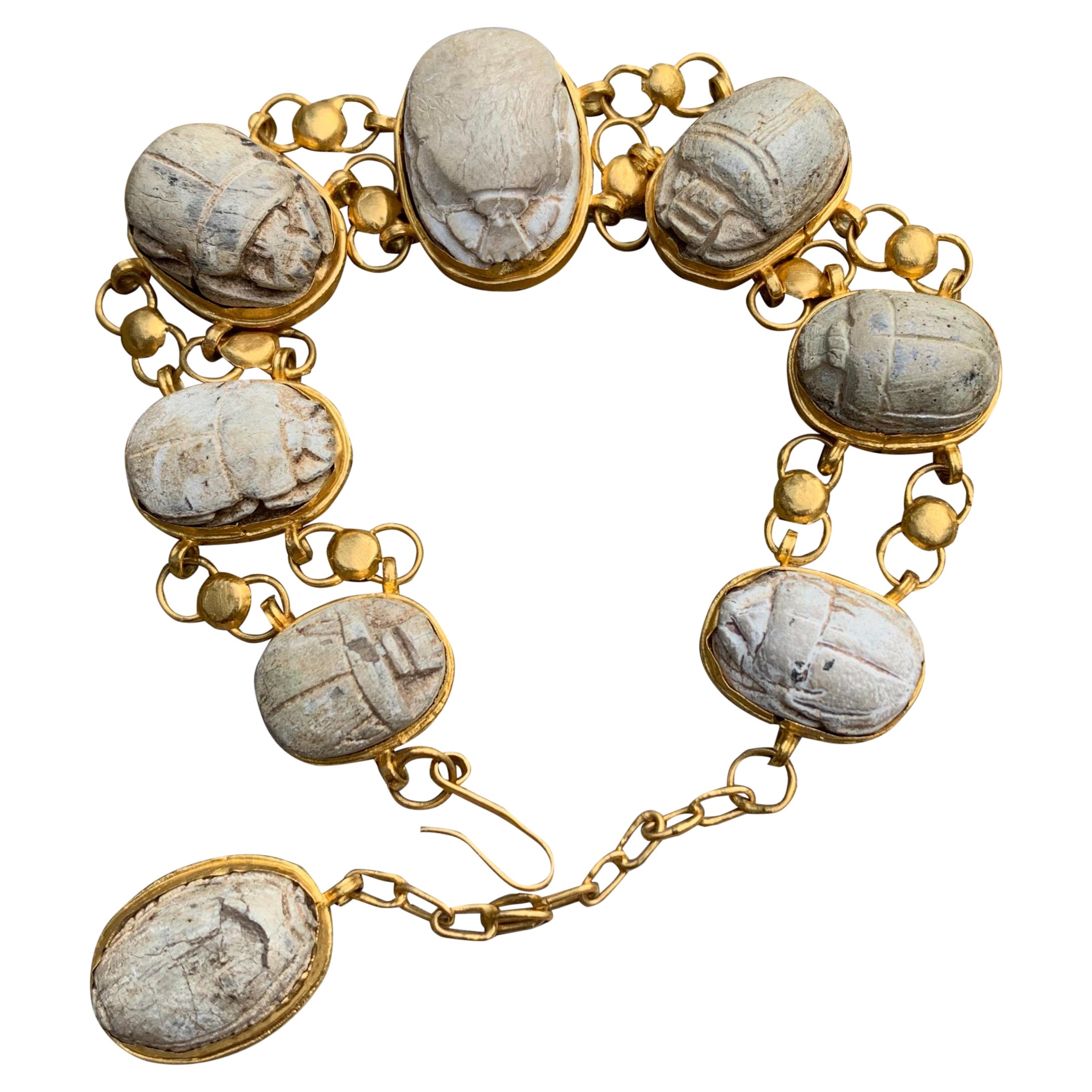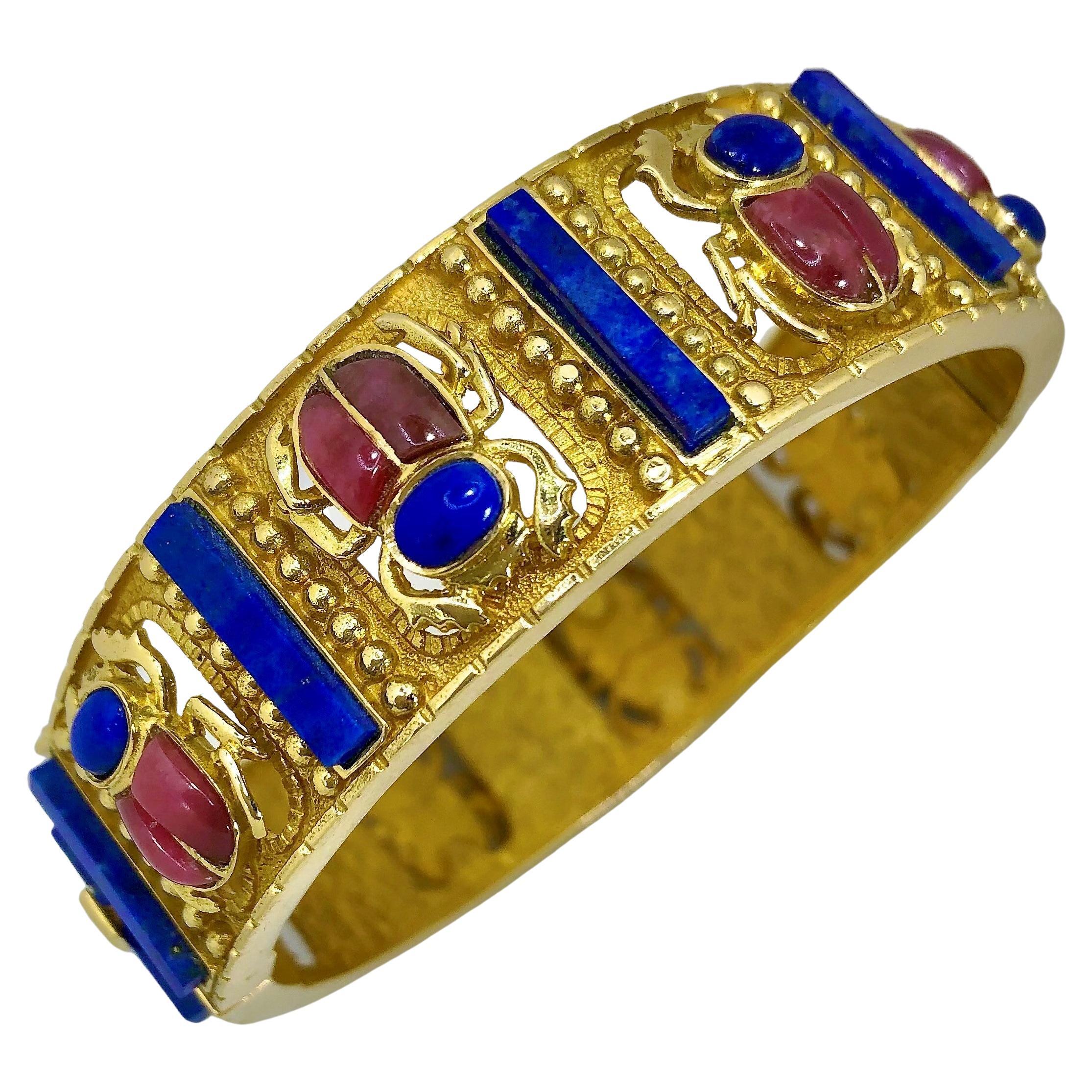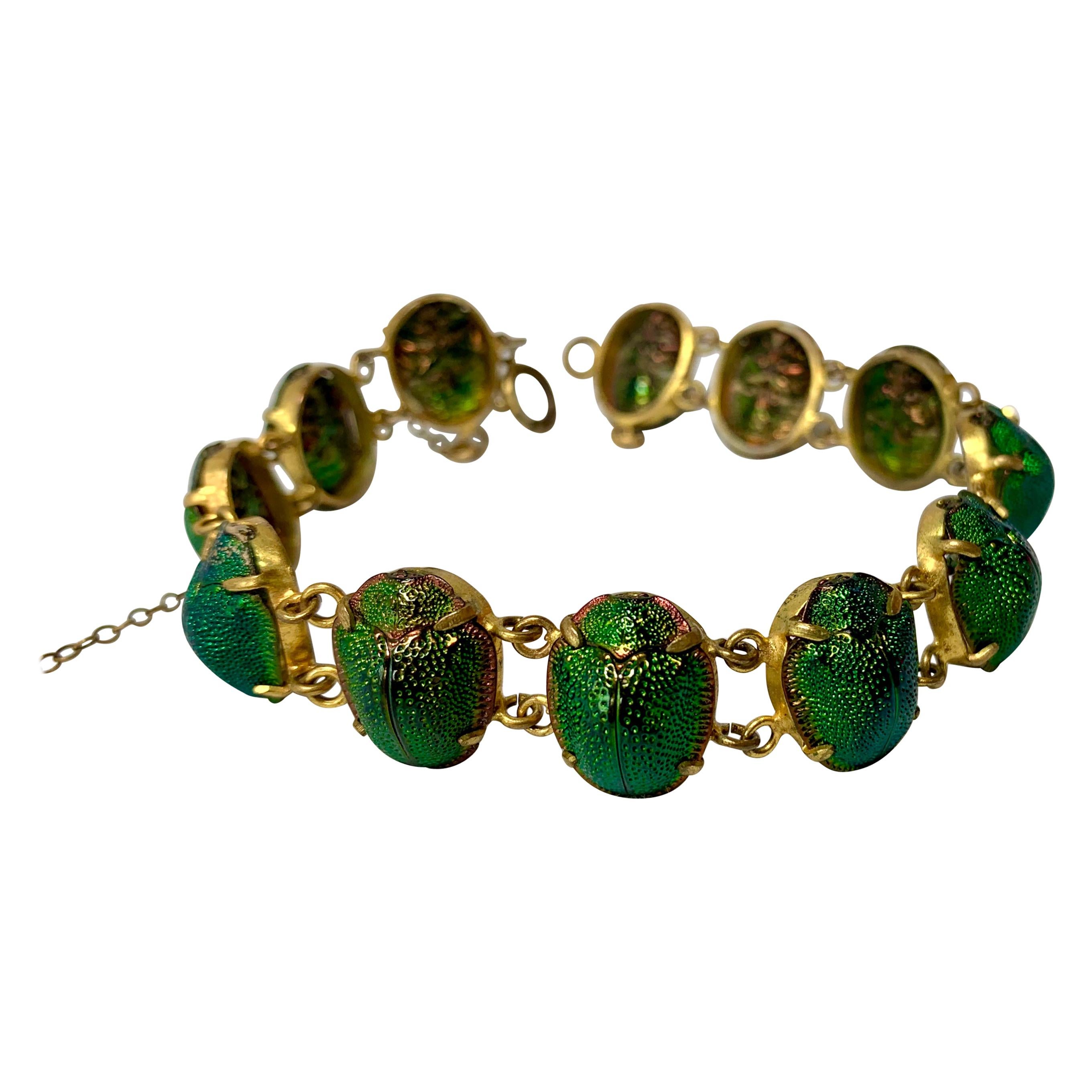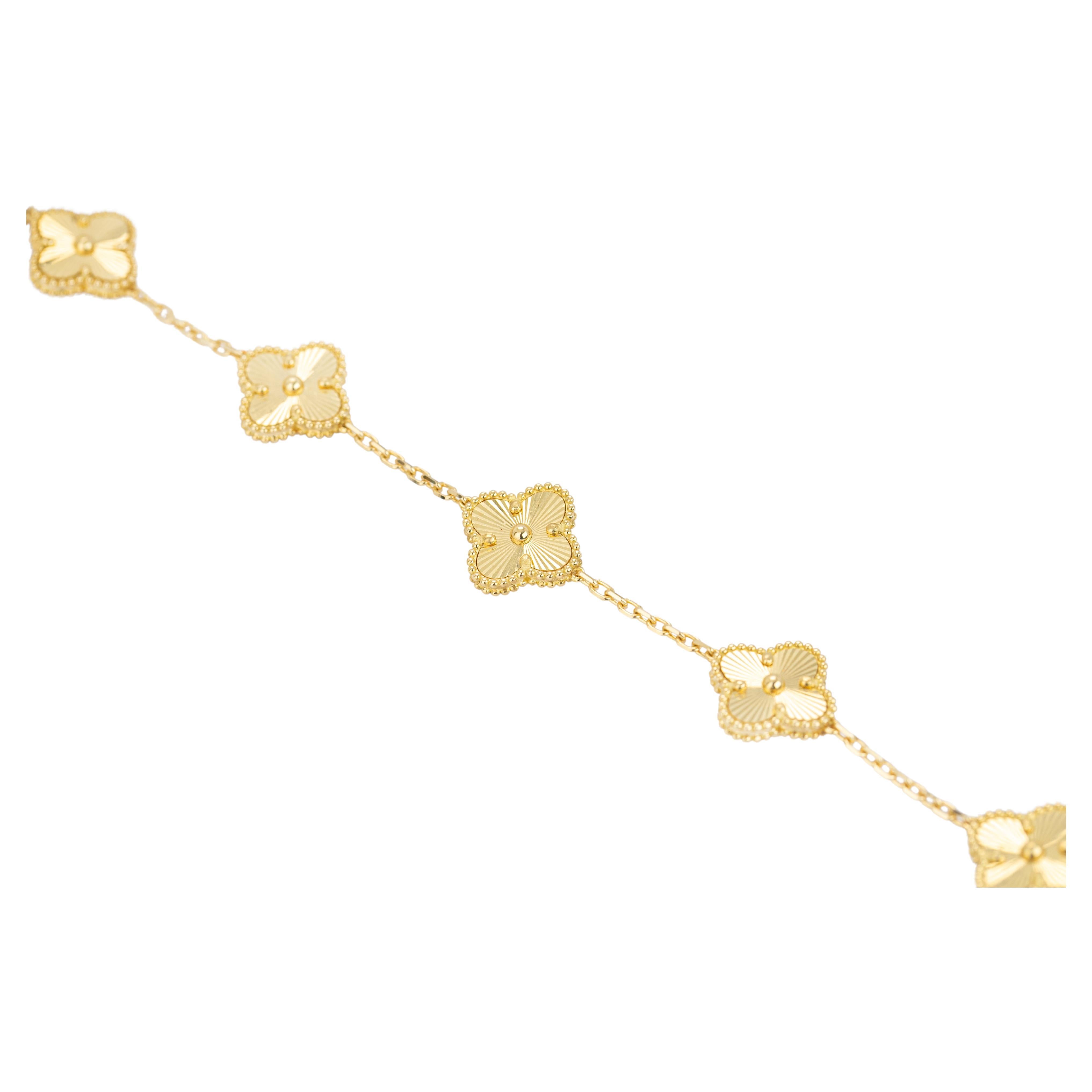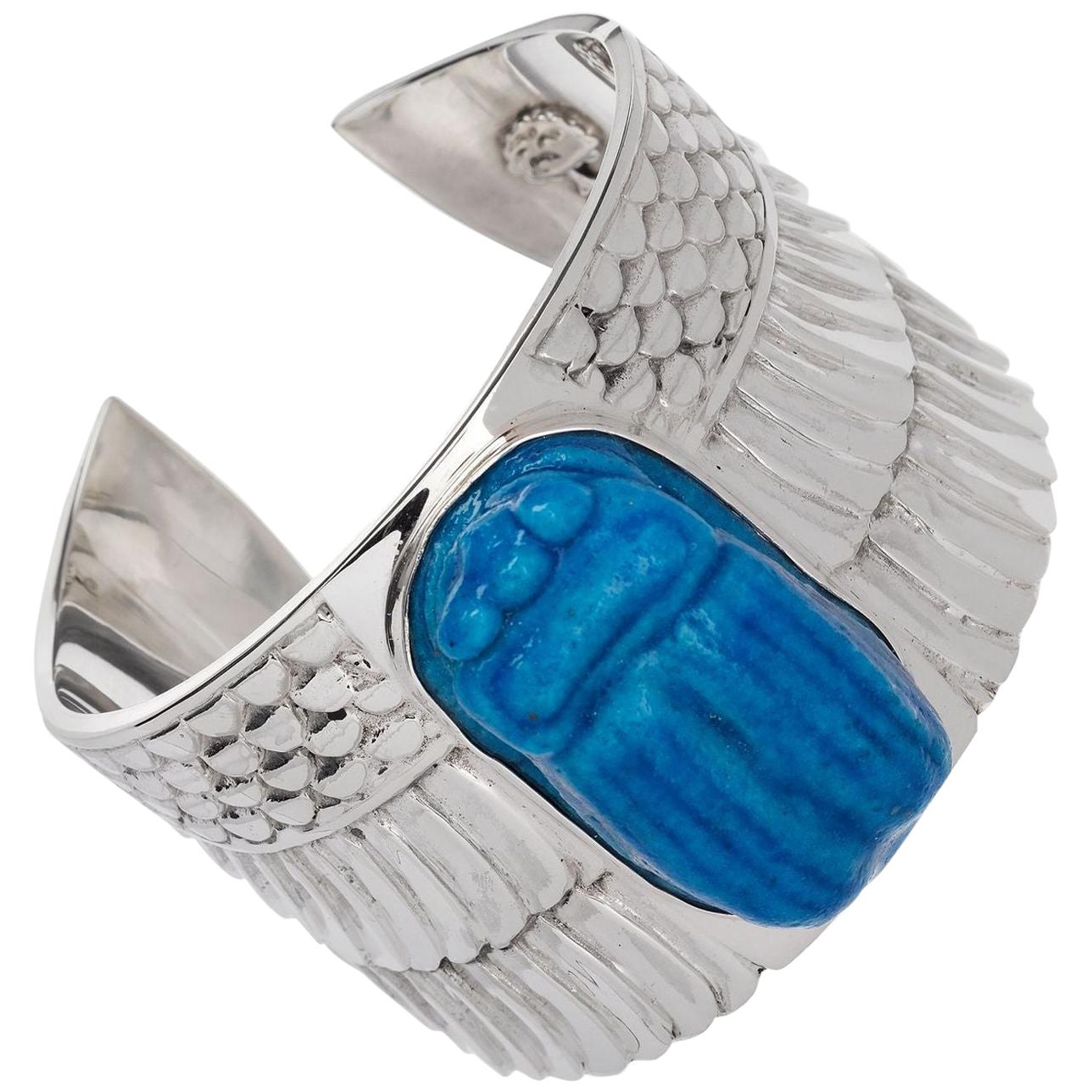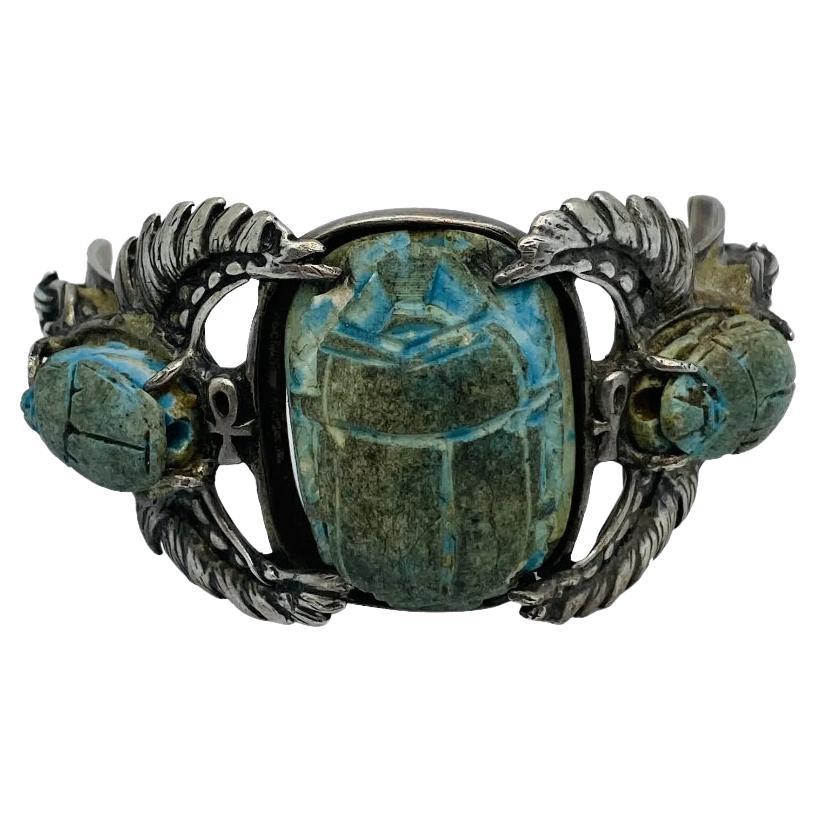Items Similar to 18K Gold Egyptian Revival Faience Scarab Bracelet
Video Loading
Want more images or videos?
Request additional images or videos from the seller
1 of 10
18K Gold Egyptian Revival Faience Scarab Bracelet
About the Item
This 18k gold bracelet contains eight scarabs in various shades of blues, greens, and browns, each with a unique hieroglyphic. Made from clay, the scarab beads get their coloring when copper within the clay turns turquoise during the firing process; no two scarabs are alike and their rustic nature makes this piece fascinating to look at. The 18k gold bezel mounts have a saw tooth that adds a graphic and holds the scarabs in place. The hand-carved symbols on the back of each scarab are very detailed— and tell a story in the ancient language of hieroglyphics.
During the early 19th century, the discoveries of ancient archaeological finds influenced what is referred to as "Egyptian Revival Jewelry." The first Egyptian Revival period began around the 1820’s when Egyptian ruins were unearthed. Images such as the scarab beetle, sphinxes, pharaohs, and hieroglyphics became popular in fashion. Some pieces were crafted using a material known as Egyptian Paste or "faience", which is the oldest form of non-clay glazed ceramic, and is often found in a range of blue and green colors. This bracelet is from the 1920’s, the third Egyptian revival period. At that time there was another unearthing of treasures, so the trend was once again popular.
The bracelet is unmarked and acid tests as 18k gold. There are eight scarabs, each is approximately 5/8” x 7/16”. The bracelet is 7 3/8” and weighs 18 grams.
Circa the 1920’s.
- Metal:
- Weight:18 g
- Dimensions:Length: 7.38 in (187.46 mm)
- Style:
- Place of Origin:Egypt
- Period:
- Date of Manufacture:1920
- Condition:Wear consistent with age and use. In very good condition with no visible wear.
- Seller Location:Venice, CA
- Reference Number:1stDibs: LU3051221468442
About the Seller
4.9
Platinum Seller
These expertly vetted sellers are 1stDibs' most experienced sellers and are rated highest by our customers.
Established in 2010
1stDibs seller since 2022
138 sales on 1stDibs
Typical response time: 2 hours
- ShippingRetrieving quote...Ships From: Venice, CA
- Return PolicyA return for this item may be initiated within 3 days of delivery.
More From This SellerView All
- Egyptian Revival Beige Faience Scarab Pendant with 14K Gold MountLocated in Venice, CADuring the early 19th century, the discoveries of ancient archaeological finds influenced and introduced what is referred to as "Egyptian Revival Jewelry." The first Egyptian Revival...Category
Vintage 1920s Unknown Egyptian Revival Pendant Necklaces
Materials14k Gold, Yellow Gold
- Egyptian Revival Brown Faience Scarab Pendant with 14K Gold MountLocated in Venice, CADuring the early 19th century, the discoveries of ancient archaeological finds influenced and introduced what is referred to as "Egyptian Revival Jewelry." The first Egyptian Revival period began around the 1820’s, inspired by the unearthing of ancient Egyptian ruins during that time. Images such as the scarab beetle, sphinxes, pharaohs, and hieroglyphics became popular motifs in fashion. Pieces were often crafted using a material known as Egyptian Paste or "faience", which is the oldest form of non-clay glazed ceramic and usually found in a range of blue and green colors. In the 1920’s, there was another unearthing of treasures, making the trend popular once again. This scarab pendant is from that era—the third Egyptian Revival period. The scarab is a brown colored faience bead with tan overtones in its recesses that delineate the shape of the beetle. There are hieroglyphics on the back of the scarab. At the bottom of the scarab is a round 14k gold ball that extends as a wire through the bead and forms a bale at the top. The pendant measures 1 “ from the bottom of the ball to the top of the bale. The scarab measures 11/16” x 1/2”. The bale measures 5 mm. The piece weighs 2.55 grams. The gold is unmarked and acid tests as 14k. The scarab is in excellent condition for its age and is ready to hang on a chain of your choice. We have other sizes and colors of scarab jewelry...Category
Vintage 1920s Unknown Egyptian Revival Pendant Necklaces
Materials14k Gold, Yellow Gold
- Egyptian Revival Small Turquoise Faience Scarab Pendant with 14K Gold MountLocated in Venice, CADuring the early 19th century, the discoveries of ancient archaeological finds influenced and introduced what is referred to as "Egyptian Revival Jewelry." The first Egyptian Revival period began around the 1820’s, inspired by the unearthing of ancient Egyptian ruins during that time. Images such as the scarab beetle, sphinxes, pharaohs, and hieroglyphics became popular motifs in fashion. Pieces were often crafted using a material known as Egyptian Paste or "faience", which is the oldest form of non-clay glazed ceramic and usually found in a range of blue and green colors. In the 1920’s, there was another unearthing of treasures, making the trend popular once again. This scarab pendant is from that era—the third Egyptian Revival period. The scarab is a turquoise colored faience bead with green overtones in its recesses that delineate the shape of the beetle. There are hieroglyphics on the back of the scarab. At the bottom of the scarab is a round 14k gold ball that extends as a wire through the bead and forms a bale at the top. The pendant measures 7/8“ from the bottom of the ball to the top of the bale. The scarab measures 1/2” x 5/16”. The bale measures 5 mm. The piece weighs 1.06 grams. The gold is unmarked and acid tests as 14k. The scarab is in excellent condition for its age and is ready to hang on a chain of your choice. We have other sizes and colors of scarab jewelry...Category
Vintage 1920s Unknown Egyptian Revival Pendant Necklaces
Materials14k Gold
- Egyptian Revival Faience Turquoise and Brown Scarab Pendant with 14K Gold MountLocated in Venice, CADuring the early 19th century, the discoveries of ancient archaeological finds influenced and introduced what is referred to as "Egyptian Revival Jewelry." The first Egyptian Revival period began around the 1820’s, inspired by the unearthing of ancient Egyptian ruins during that time. Images such as the scarab beetle, sphinxes, pharaohs, and hieroglyphics became popular motifs in fashion. Pieces were often crafted using a material known as Egyptian Paste or "faience", which is the oldest form of non-clay glazed ceramic and usually found in a range of blue and green colors. In the 1920’s, there was another unearthing of treasures, making the trend popular once again. This scarab pendant is from that era—the third Egyptian Revival period. The scarab is a turqoise colored faience bead with brown and beige overtones in its recesses that delineate the shape of the beetle. There are hieroglyphics on the back of the scarab. At the bottom of the scarab is a round 14k gold ball that extends as a wire through the bead and forms a bale at the top. The pendant measures 15/16“ from the bottom of the ball to the top of the bail. The scarab measures 1/2” x 3/8”. The bale measures 5 mm. The piece weighs 1.63 grams. The gold in unmarked and acid tests as 14k. The scarab is in excellent condition for its age and is ready to hang on a chain of your choice. We have other sizes and colors of scarab jewelry...Category
Vintage 1920s Unknown Egyptian Revival Pendant Necklaces
Materials14k Gold
- 18K Gold Victorian Egyptian Revival Nekhbet Necklace with Diamonds and PearlsLocated in Venice, CAThis 18k gold two-sided French Victorian Egyptian Revival pendant necklace features the portrait of the goddess Nekhbet, surrounded by a lace-like halo of pearls and Rose Cut diamond...Category
Antique 1880s French Egyptian Revival Pendant Necklaces
MaterialsDiamond, Pearl, 18k Gold, Yellow Gold
- Signature 14K Gold Egyptian Revival Nekhbet CharmLocated in Venice, CAPart of Kirsten’s Corner’s Cute as a Button series, this 14k gold charm was cast from a Victorian era button. It features a side profile view of the goddess Nekhbet wearing her tradi...Category
21st Century and Contemporary American Contemporary Pendant Necklaces
Materials14k Gold, Yellow Gold
You May Also Like
- 20 Karat Gold Scarab Beetle Bracelet Antique Egyptian Revival HieroglyphicsLocated in New York, NYThis is a very rare and wonderful antique Egyptian Revival Bracelet with eight graduated Scarab Beetles set in 20 Karat Yellow Gold w...Category
20th Century Unknown Egyptian Revival Link Bracelets
MaterialsGold, 18k Gold, Yellow Gold
- Egyptian Style 18k Yellow Gold, Lapis Lazuli & Rhodonite Scarab Beetle BraceletLocated in Palm Beach, FLThis very well crafted Egyptian style bangle bracelet exhibits many different gold textures that are inlaid with vivid blue Lapis Lazuli columns a...Category
Late 20th Century Unknown Egyptian Revival Bangles
MaterialsLapis Lazuli, 18k Gold, Yellow Gold
- Iridescent Enamel Scarab Beetle Bracelet Antique Egyptian RevivalLocated in New York, NYA very rare and wonderful antique Egyptian Revival Bracelet with 12 Iridescent Green Enamel Scarab Beetles. The jewel an Egyptian Rev...Category
Early 20th Century Unknown Art Deco Link Bracelets
MaterialsEnamel, Gold-filled
- 18k Gold Bracelet with Bold Chain, 18k Gold Chain Bracelet, Rectangle BraceletLocated in ISTANBUL, TR18K Gold Bracelet with Bold Chain, 18K Gold Chain Bracelet, Rectangle Bracelet delicate bracelet created by hands from chain to the stone shapes. Good ideas of dainty bracelet or sta...Category
2010s Turkish Contemporary Chain Bracelets
Materials18k Gold
- Turquoise Egyptian Scarab Faience Cuff in Sterling Silver BraceletLocated in London, GBThis one of a kind turquoise faience flying scarab encircles your wrist with its silver wings . Amulets in the shape of scarab beetles were used in Egypt ...Category
21st Century and Contemporary British Egyptian Revival Cuff Bracelets
MaterialsTurquoise, Silver, Sterling Silver
- Antique Scarab Egyptian Faience Bangle CuffLocated in New York, NYAntique Egyptian Faience Bangle Cuff In great condition please see the photos Size is approximately 2 ½ inches from top to bottom please see photos ...Category
Antique 19th Century Cuff Bracelets
Recently Viewed
View AllMore Ways To Browse
Revival Jewellery
Revival Jewlery
Antique Gold Beads
Egypt Gold
Egyptian Gold
Gold Revival Jewellery
18k Gold Bracelet 8
Image Bracelet
Unmarked Gold
Egypt Jewellery
Egypt Jewelry
Egyptian Jewellery
Egyptian Jewlery
Egyptian Jewelry
Bezel Mount
Gold Egyptian Jewelry
18k Green Gold Bracelet
Ancient Egyptian Jewellery
